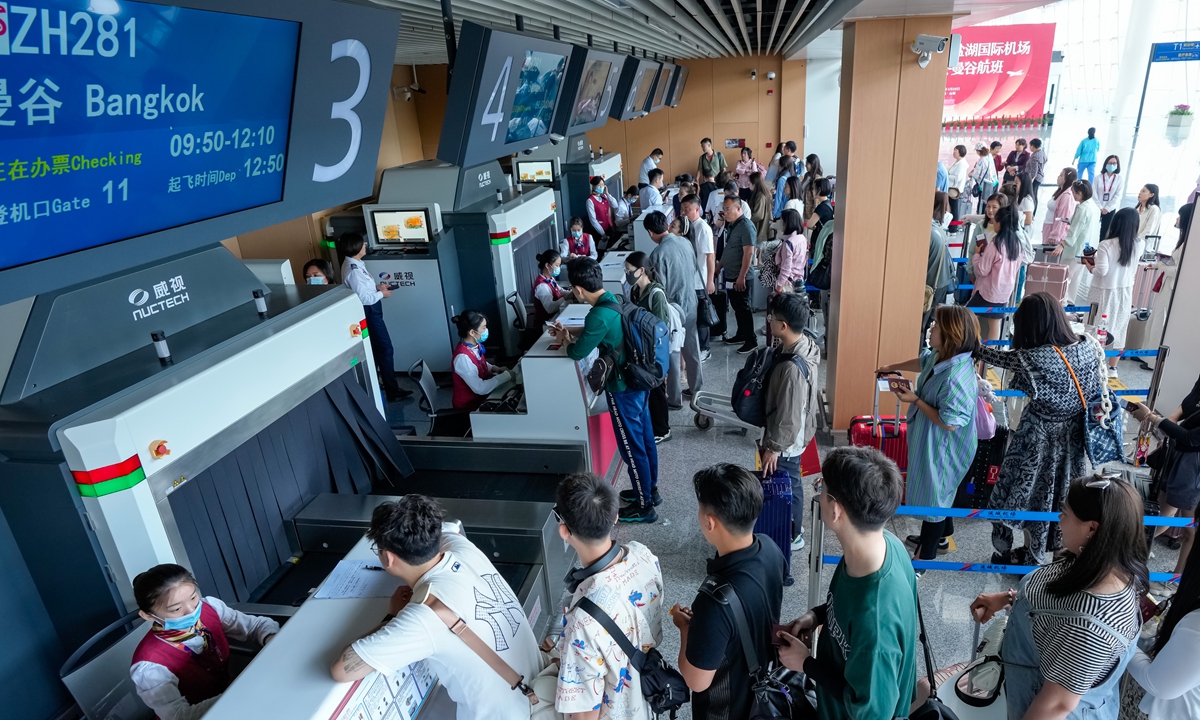
Passengers line up to check in for the direct flight launched by Shenzhen Airlines from Yuncheng, North China's Shanxi Province to Bangkok, Thailand on April 28, 2024. As the international market gradually opens up, many airlines have added, resumed and expanded routes. Photo: cnsphoto
As Thailand extended the period of visa-free stays from 30 to 60 days starting from Monday for people from 93 countries and regions, including China, the search volume for destinations such as Bangkok on various Chinese travel platforms has shown a significant increase. The move will further entice Chinese tourists to visit Thailand as well as promote bilateral people-to-people exchanges, analysts said.
According to the Public Relations Department of the Thai government on Monday, Prime Minister Srettha Thavisin announced the significant policy change. The new regulation aims to boost tourism and make travel to Thailand more convenient for visitors from a wide range of countries, Thailand Business News reported.
Thailand has seen a 35 percent increase in foreign arrivals this year through July 7, compared to the same period in 2023, reaching 18.2 million visitors. The top sources of tourists so far in 2024 are China, Malaysia, and India, according to media reports.
Shortly after the extension, Bangkok ranked first in the search index for overseas destinations for Chinese tourists, Yicai reported. The search popularity has increased by 14 percent compared with the same period last week, data from Qunar showed.
On Tuesday afternoon, there were already Chinese tourists sharing on Xiaohongshu, a Chinese equivalent to Instagram, that they were enjoying the 60-day visa-free treatment when entering Thailand, the Global Times learned.
Gu Xiaosong, dean of the ASEAN Research Institute of Hainan Tropical Ocean University, told the Global Times on Tuesday that the latest extension of the visa policy in Thailand will serve as a catalyst for increased Chinese tourists to the country, while at the same time, friendly people-to-people exchanges and business communications will also be further enhanced.
The exchanges related to education and culture between the two countries will also be fostered, which is beneficial for bilateral relations, Gu said.
However, recent safety incidents involving Chinese nationals in Thailand have also raised concerns for travelers visiting the country. A Chinese female tourist went missing in Thailand on July 1, with later evidence from the local police suggesting that the woman was dismembered, according to local media reports.
The Chinese Embassy in Thailand also reminded Chinese nationals on Tuesday to be alert to virtual kidnapping, as the embassy has received multiple requests for help from Chinese students studying in Australia, Canada, Japan and other countries who have been "virtually kidnapped" by fraudsters to Thailand. The Chinese nationals in Thailand should enhance their awareness of safety, and avoid falling into the trap of criminals, the embassy said in a statement.
Given recent safety incidents, Gu stressed the importance of Thailand enhancing security measures for foreign tourists, particularly in light of the increased personnel exchanges between Thailand and a number of countries, including China, resulting from the expanded visa-free policy.
On the other hand, China and Thailand should also strengthen their collaboration in immigration management and work together to combat cross-border crimes, Gu said.




